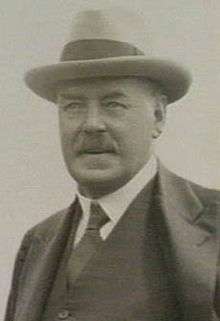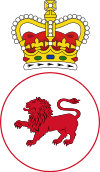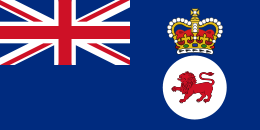James O'Grady
| Sir James O'Grady KCMG | |
|---|---|
 | |
| 14th Governor of Tasmania | |
|
In office 23 December 1924 – 23 December 1930 | |
| Monarch | King George V |
| Preceded by | Sir William Allardyce |
| Succeeded by | Sir Ernest Clark |
| 17th Governor of the Falkland Islands | |
|
In office 1931–1934 | |
| Monarch | King George V |
| Preceded by | Sir Arnold Hodson |
| Succeeded by | Sir Herbert Henniker-Heaton |
| Member of Parliament for Leeds South East | |
|
In office 14 December 1918 – 29 October 1924 | |
| Preceded by | Constituency Created |
| Succeeded by | Henry Slesser |
| Member of Parliament for Leeds East | |
|
In office 8 February 1906 – 14 December 1918 | |
| Preceded by | Henry Struther Cautley |
| Succeeded by | Constituency Abolished |
| Personal details | |
| Born |
6 May 1866 Bristol, England, UK |
| Died |
10 December 1934 (aged 68) London, UK, UK |
| Nationality | British |
| Political party | Labour |
Sir James O'Grady, KCMG (6 May 1866 – 10 December 1934) was a trade unionist and Labour Party politician in the United Kingdom. He was the first colonial governor appointed by the Labour Party from within its own ranks.
Early life
O'Grady was born in Bristol to Irish parents. His father was a labourer, and after leaving school at ten, O'Grady did various lowly jobs, before training as a cabinet-maker, and became active in the Amalgamated Union of Cabinetmakers.
Political career
A member of the Independent Labour Party and supported by the Labour Representation Committee, he was elected at the 1906 general election as Member of Parliament (MP) for Leeds East. He had benefited from an electoral pact negotiated between Herbert Gladstone and Ramsay MacDonald, and faced only a Unionist opponent, who he defeated by a wide margin.
O'Grady was re-elected at the elections in January 1910 and December 1910 elections, and when the Leeds East constituency was abolished for the 1918 general election, he was returned unopposed for the new Leeds South East constituency. He held that seat until he stepped down from Parliament at the 1924 general election.
In the House of Commons, he spoke frequently, particularly on foreign affairs, and was noted as a strong supporter of the First World War, speaking at recruitment rallies. He was also Labour's only Roman Catholic MP.
Through his role in the Amalgamated Union of Cabinet Makers, he had been President of the Trades Union Congress in 1898, and he continued his union activities whilst an MP. After a variety of posts in unions related to the furniture trades,[1] he became general secretary of the National Federation of General Workers in 1918.
Governorships
In 1924, Ramsay MacDonald's First Labour Government offered O'Grady the post of British Ambassador to the Soviet Union, and he accepted.[2] He was a logical choice because he had successfully negotiated an exchange of prisoners in 1919 and had been involved in international trade union-led efforts to relieve the Russian famine in 1921, but O'Grady did not in the end get the job, because the government postponed exchanging ambassadors.[2]
Instead he became Governor of Tasmania from 1924 to 1930. The first Labour politician to be appointed as a colonial governor by a Labour government, his appointment was resisted by the Australian Labor Party, which wanted the job to go to an Australian.
He was knighted with a KCMG and moved to Tasmania, taking office on 23 December.[3] His governorship was marked by conflicts with the Legislative Council (which urged to do more to promote economic development), and his governors reports were outspoken, but he appears to have parted on good terms.
His next appointment was in 1931, as Governor of the Falkland Islands, but he retired in 1934 due to ill-health. He died later that year, aged 68.
Trivia
In 1910, O'Grady and three other MPs, along with Professor Stanley Poole, formally nominated for the Nobel Peace Prize the Polish physician L. L. Zamenhof, inventor of Esperanto.[4]
Notes
- ↑ There were many mergers of unions in that period, and craft- and area-based unions merged to form national, industry-based unions, and the union names listed in the available sources do not entirely correspond to the list of furniture unions at http://www.wcml.org.uk/tu/furnish.htm.
- 1 2 Time Magazine, 24 February 1924
- ↑ Australian States
- ↑ Nobel Prize nomination database
References
- Craig, F. W. S. (1983) [1969]. British parliamentary election results 1918–1949 (3rd ed.). Chichester: Parliamentary Research Services. ISBN 0-900178-06-X.
- Australian Dictionary of Biography online: O'Grady, Sir James (1866–1934)
- Dictionary of National Biography: James O'Grady
- Leigh Rayment's Peerage Pages
External links
- Picture of O'Grady at the State Library of Victoria
- Hansard 1803–2005: contributions in Parliament by James O'Grady
| Parliament of the United Kingdom | ||
|---|---|---|
| Preceded by Henry Cautley |
Member of Parliament for Leeds East 1906 – 1918 |
Constituency abolished |
| New constituency | Member of Parliament for Leeds South East 1918 – 1924 |
Succeeded by Henry Slesser |
| Trade union offices | ||
| Preceded by J. V. Stevens |
President of the Trades Union Congress 1898 |
Succeeded by W. J. Vernon |
| Preceded by Matthew Arrandale and Enoch Edwards |
Trades Union Congress representative to the American Federation of Labour 1903 With: William Mullin |
Succeeded by William Abraham and James Wignall |
| Preceded by Allan Gee |
Chairman of the General Federation of Trade Unions 1912 – 1918 |
Succeeded by Thomas Mallalieu |
| Government offices | ||
| Preceded by Sir William Allardyce |
Governor of Tasmania 1924–1930 |
Succeeded by Sir Ernest Clark |
| Preceded by Sir Arnold Weinholt Hodson |
Governor of the Falkland Islands 1931–1934 |
Succeeded by Sir Herbert Henniker-Heaton |

